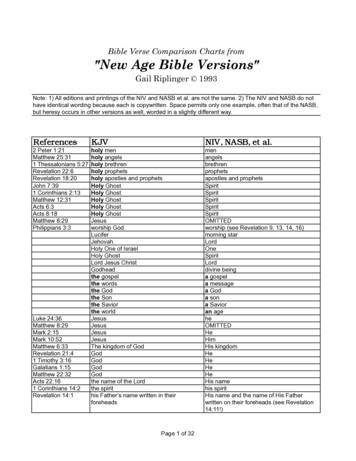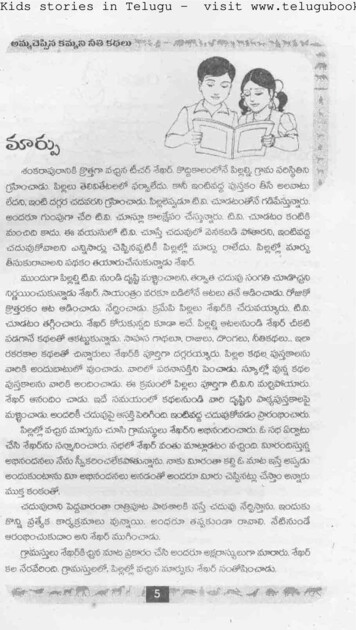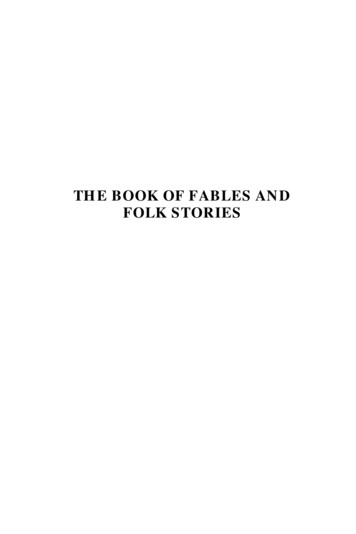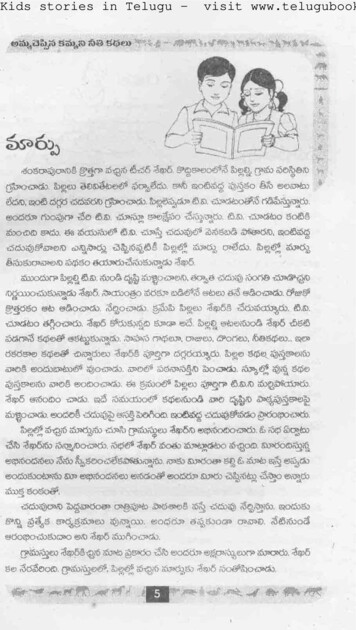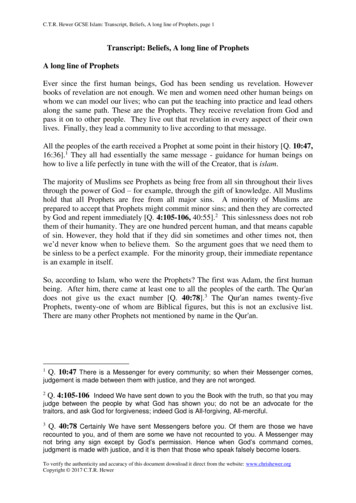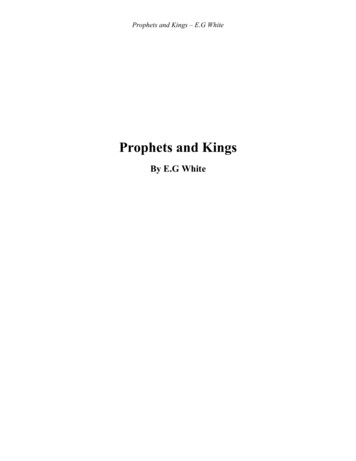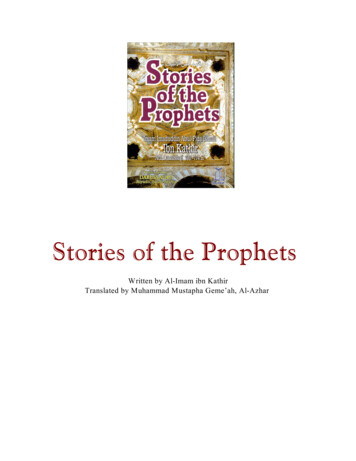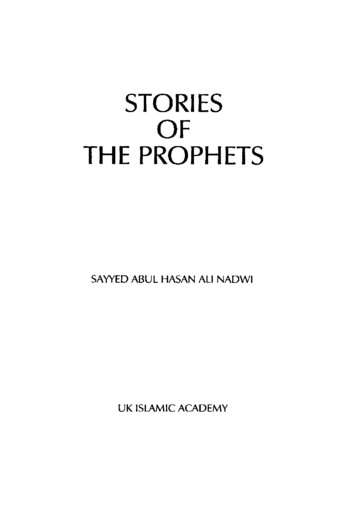
Transcription
STORIESOFTHE PROPHETSSAWED ABUL HASAN ALI NADWIUK ISLAMIC ACADEMY
UK Islamic Academy, 1990, 1999,2007,2009,2011ISBN 978 1 872531 09 0All rights reserved.No part of this publication may bereproduced, stored in a retrieval system,or transmitted in any form or by anymeans, electronic mechanical,photocopying, recordingor otherwise, without theprior permission of thecopyright owner.Published byUK Islamic Academy147 Mere RoadHighfieJds, LeicesterLE5 5GQUnited KingdomWebsite: www.ukiabooks.comE-mail: info@ukiabooks.comBritish Library Cataloguing in Publication DataA catalogue record fOT this book is avalible from the British Library.Printed by Imak Ofset, Turkey
DedicationDear Nephew (Muhammad al-Hasani),I know that you, like other children of your age,have a keen interest in reading and listening to stories.What saddens me is that stories you read are only aboutanimals - cats, dogs, lions, wolves, monkeys and bears.We your elders are to blame for this sad state of affairs,for these are the only stories available for you.That is why I planned to write a series of storybooks in Arabic suitable for children of your age, dealingwith the life and the work of the Prophets and Messengers. Olses al-Nabiyeen (Stories Of The Prophets), beingthe first part of the series, is presented here. It is my giftto you.In this series of stories I have tried to write in away that suits the interests of children. That is why I haverepeated certain expressions and kept the story simple.I believe this may be the first book of its kind for childrenstudying in religious institutions. In future titles in thisseries, you will read other interesting, clear and movingaccounts of other Prophets of Allah. What happens inthese stories is very special, because, unlike other stories,they are totally free of any lie or falsehood.May Allah, through you, bring happiness andpeace to your parents, to your uncle and to Islam andhelp to restore the glory of your ancestors the Muslimswho came before you. (Ameen)Ali al-Hasani
ContentspageForeword. . . . . . . . . . . . . . . . . . . . . . . . . . .5. . . . . . . . . . . . . . . . . . . . . . . . . .71.The Prophet N uh . . . . . . . . . . . . . . . . . . .92.The Prophet Hud . . . . . . . . . . . . . . . . . .223.The Prophet Salih294.The Prophet Ibrahim385.The Prophet Yusuf . . . . . . . . . . . . . . . . .486.The Prophet Musa . . . . . . . . . . . . . . . . .677.The Prophet Shu'ayb1248.The Prophets Da'ud and Sulayman . . . . . .1309.The Prophets Ayyub and Yunus . . . . . . . .14110.The Prophets Zakariyya and Yahya . . . . . .14511.The Prophet 'Isa ibn Maryam . . . . . . . . . .150IntroductionWorkbook. . . . . . . . . . . . . . . . . . . . . . . . . .3169
Islamic and Biblical hYusufZakarivva4
ForewordThe Prophets were chosen by Allah to guidemankind to the Divine Path. They faced many difficultiesand suffered severe hardships in their efforts to call theirstraying people to obey and worship Allah. This edition ofStories of the Prophets presents the lives of Allah's Prophets(peace and blessing be upon them). The stories werewritten by the renowned Islamic scholar Maulana SayyedAbul Hasan Ali Nadwi. He is one of the greatest livingauthorities on Islam and his works are used as textbooksthroughout the Arab and Muslim world.This translation from a major Arabic work providesEnglish-speaking Muslims with the benefits of MaulanaSayyed Abul Hasan's scholarship. The stories which havebeen drawn from the Holy Qur' an constantly reflect theauthor's depth of knowledge. They are written in a livelystyle with subtleties explained and descriptions vividlyportrayed to provide the reader with a clear picture of eachProphet's mission.Each story is a delight to read and should provideboth adults and children with a fresh insight into the life ofthe men Allah chose to guide their communities. The storyof the last Prophet has not been included in this edition asit deserves a book to itself. To ensure that young people5
receive all the guidance,knowledgeand inspiration thatis included.My thanks are due to Sis. Aisha Bewley, Sis.Maryam Davies, Bro. [amil Qureshi, my daughters Su'ad.Shifa' and my other children for their help in producingthis book. May Allah accept this effort and make it a sourceof inspiration and guidance for all.Leicester (England)Iqbal Ahmad AzamiShawwal 1410 A.HMay 1990Stories of the Prophets offers, a workbook6
IntroductionI know Sayyed Abul Hasan Nadwi, the author ofthis book, both in person and through his writings. I findin him the heart and mind of a Muslim - he has spent hiswhole life in the service of Islam - in addition to histhorough knowledge and insight into Islam. This is mytestimony which I affirm for Allah's sake in this introduction.Though quite small, Stories of the Prophets is amajor work and a substantial addition to the opus of SayyedAbul Hasan and his distinguished contemporaries in thefield of Islamic Da'wah (in the Indian subcontinent). Islammust be taught in its pristine purity not only to adults butalso to Muslim children. They are in greater need of suchfood for thought which may instruct them in the messageof Islam. For it will help them grow up with the taste ofIslam in their souls, the radiance of faith in their hearts andjoy in their spirits. Stories are the basic constituency thathelp orient and mature the supple minds of children. Yet,though meant for children, this book will, I believe, beinvaluable to adults also. For many Muslim adults taughtunder the colonial and Christian missionary-dominatededucational system have been deprived of the opportunityto know the Qur'anic stories, to value their profoundmeaning, their spiritual quality, and their effectiveness,which are to the fore in this book.J have read many books for children including thoseabout the Stories of the Prophets (peace be upon them).7
Indeed, I have been closely associated with a series ofbooks drawn from the Holy Qur'an. Nonetheless, I testifywithout reservation, thatAbul Hasan's present book surpasses all such works. What accounts for its excellence is theinclusion, with elucidation, of subtle teachings of theQur' an, of explanations that highlight and reinforce theQur'anic message, through the author's apt commentsinterwoven into the telling of the story. These commentsprovide glimpses of the greatest religious truths and theyeasily and effectively enter into the hearts of children andadults alike.May Allah bestow His choicest rewards on SayyedAbul Hasan and grant him the strength to carry out moresuch works. May Allah guide through his writings the futuregenerations of Muslims that are under the constant attackof storms of disbelief, whose paths are strewn with thorns,whom black darkness surrounds, and who so urgentlyneed guidance, light, care and sincere counselling for theirgrowth. Allah alone grants the strength to accomplish everygood deed.Sayyed Qutb8
1. The Prophet NuhAfter Adam (peace and blessings be upon him)*Allah blessed the descendants of Adam, his childrenand grandchildren, and they spread and multiplied. IfAdam had come back and seen them all, and someonehad said to him, 'These are your descendants, Adam,' hewould have been astonished. He would have said, 'Glorybe to Allah! These are all my children! These are all mydescendants!'Adam's descendants founded many villages. Theybuilt many houses. They ploughed the land, grew cropsand lived in comfort and contentment. They followed theway of their ancestor, Adam. They worshipped only Allahand did not worship anything else besides Him.They were one united community. Adam was theone father of all of them, and Allah was their One Lord.Satan's envySatan hadhad commandeddamned for ever.be content withnot bowed down to Adam when Allahhim to do so. So he was driven out andBut how could Satan and his descendantsthis? Were not people still worshipping*Muslims are required to invoke Allah's blessings and peace upon theProphetswhenever their name is mentioned.9
Allah? Were not people still a single community with nodifferences? That could not be! Would Adam's descendantsgo to the Garden while Iblis and his descendants went tothe Fire? That could not be! Should not he take revenge onthe sons of Adam so that they wou Id go to the Fire with him?Satan's ideaBut how could Satan do that when people wereworshipping Allah? He decided to call them to worshipidols so that they would go to the Fire and never get tothe Garden. He knew that Allah forgives people all sins, ifHe so wills, except one. Allah never forgives peopleworshipping other things besides Him or as well as Him.So Satan decided to call the people to associateother things with Allah so that they would never go to theGarden. But how could he persuade them?If he went to the people and said to them, 'Worshipidols. Do not worship Allah,' they would curse him andchase him off. They would say: 'Allah forbid! How canwe associate other things with our Lord? How can weworship idols? You are a cursed satan! You are a foul satan!'So Satan had to look for another way, a clevererway, to get the people to do as he wanted.Satan's trickThere had been men who feared Allah and worshipped Him night and day and who remembered Him often.They had loved Allah, so Allah had loved them andanswered their prayers. People loved them and spoke ofthem with respect long after they had died and gone toAllah's mercy.10
Satan was well aware of this. So he went to thepeople and mentioned those men. He said, 'What do youthink of So-and-so and So-and-so and So-and-so?'They said, 'Glory be to Allah! They were men ofAllah and His friends. When those men prayed, Heanswered them. When they asked, He gave to them.'Pictures of the righteous menSatan asked, 'How great is your sorrow for them?'They replied, 'Very great indeed.'He asked, 'How great is your longing for them?'They replied, 'Very great indeed!'He asked, 'Why don't you look at them every daythen?' They said, 'How can we do that when they aredead?' He said, iMake pictures of them and look at themevery morning.'People liked Satan's idea and made such picturesand looked at them every day. Whenever they saw thepictures, they remembered how those holy men had lived.From pictures to statuesIn time, the people moved on from making picturesto making statues. They made many statues of the holymen and put them in their houses and their mosques.They still worshipped Allah and did not associateanything with Him. They knew that these were only statuesof holy men and that they could neither help nor hurt themnor provide for them. They showed them respect becausethey were reminders of the holy men.As time passed, the number of statues increased.The people respected them more and more. They got used11
to having them around and looked for blessings in them.Now whenever one of their holy men died, they wouldmake a statue of him and name it after him.From statues to idolsSons saw their fathers looking for blessings throughthe statues and saw how much respect they had for them.They saw them kiss the statues, dress them and pray toAllah in their presence. They saw them lower their headsand bow down in their presence.When the fathers passed away, the sons added towhat their fathers had done. They began to prostratethemselves before them, to ask the statues for things andto sacrifice animals to them. In this way the statues wereturned into idols.People began to worship them as they had worshipped Allah before. They had a lot of these idols. One wasWadd. Another was Suwa'. This was Yaghuth. That wasYa'uq. Another was Nasr.Allah's angerAllah became very angry with the people. Hecursed them. How could Allah not be angry with thepeople because of what they were doing? Was this whatthey were created for? Was this what they were givenprovision for?They walked on Allah's earth, but rejected Allah!They ate Allah's provision, but associated others with Allah!How terrible a sin!Allah was so angry with the people that He heldback the rain and made things hard for them. Their harvests12
were small and few children were born to them.But the people did not learn their lesson from that,they did not understand. They did not turn to Allah IIIrepentance. They needed good counsel.The messengerAllah does not speak to each person individuallyor tell each one to do this or do that. The angels are arace just like mankind. It is possible to see them and hearwhat they say, if Allah wills. But the angels do not speakto each person individually either, or tell each one to dothis or do that. Only Allah can choose the person whowill receive His message to give to the people. Allah wantedto send a messenger to the people who could speak tothem and counsel them. Allah chose to send the childrenof Adam a man from among themselves to speak to themand give them good counsel.Man or angel?Allah wanted this messenger to be a man and tobe one of the people. That way they would recognize himand understand what he said.If the messenger had been an angel, the peoplemight say, 'What has he got to do with us? He is an angeland we are mortals! We eat and drink and we have wivesand children. How can we worship Allah?' But if themessenger were a man, he could answer, 'I eat and drink;I have a wife and children. But I worship Allah. Why don'tyou worship Allah?'If the messenger had been an angel, the peoplemight say to him, 'You do not get hungry or thirsty. You13
do not get ill or die. So you can worship Allah andremember Him always!' But if the messenger were a man,he could answer, 'I am just like you. I get hungry andthirsty. I get ill and will die. But I worship Allah andremember Him. So why don't you worship Allah? Whydon't you remember Him?' In this way the people wouldnot be able to make up excuses.Nuh the MessengerAllah chose to send Nuh to his people.There were wealthy people and leaders among thechildren of Adam, but Allah alone knew who should carryHis message and who could bear His trust.Nuh was a pious and generous man; he wasintelligent and forbearing, compassionate and sincere. Hewas truthful and trustworthy and known for giving goodcounsel. Allah revealed to Nuh, IWarn your people beforea painful punishment comes to them. 1(71: 1) So Nuh stoodup among his people and told them, 'l am a faithfulmessenger to you. ((26: 107)What answer did his people give to him?When Nuh began to say to his people, 1/ am afaithful messenger to YOLl,' (26: 107) some of themanswered back, 'When did this man become a Prophet?Yesterday he was one of us and today he says, "I amAllah's messenger to you"!'Nuh's friends said, 'This man used to play with uswhen we were young and he sat with LIS every day. Whendid he become a Prophet? Was it during the day or thenight?'14
The rich and proud said, 'Couldn't Allah findanyone except him? Has everyone else died? Couldn't Hefind anyone except a poor man from among the commonpeople?'The ignorant ones said to each other: This is onlya man like yourselves. If Allah had willed He would havesent down angels. We have never heard of this among ourfathers, the ancients.' (23: 24)Some of the people said that Nuh only wanted tobecome a leader, a man of power and position amongthem, by saying he was the messenger of Allah.Nuh and his peoplePeople had got used to thinking that worshippingidols was the truth and a sensible thing to do. They thoughtthat anyone who did not worship idols was foolish. Theywould say, 'Our fathers worshipped idols, so why doesn'tthis man worship them?'Nuh thought that their fathers were in the wrongand unwise and that Adam, who was the father of thefathers, did not worship idols. He worshipped Allah alone.Nuh thought that the people were in the wrong and foolishwhen they worshipped stones and did not worship Allahwho had created them.Nuh stood up among his people, saying in hisloudest voice, '0 my people! Worship Allah! You haveno god but Him. Truly I fear for you the punishment of adreadful day.'The Council of his people said 'We see that youare in clear error. 'He said, 'My people, there is no error in me. ButI am a messenger from the Lord of all the worlds. I convey15
to you the messages of my Lord and { give you goodadvice/ for I know from Allah what you do not know. '(7: 59-62)'The lowliest follow you'Nuh tried hard to make his people abandon idolsand worship Allah alone. But only a few of those peoplewho worked with their hands and ate lawful food, lawfullyearned, believed in him.The rich were too proud of being rich to believe.Their pride kept them from listening to Nuh. Their propertyand children distracted them from thinking about the NextWorld. They would say, 'We are nobles and those peopleare lowly.' When Nuh called them to Allah, they answered,'How should we believe you when the lowliest followyou?' (26: 11)They asked Nuh to drive the poor away. Nuhrefused and said, 'l cannot drive away the believers. Mydoor is not a king's door. I am only a clear warner. '(26:114-15)Nuh knew that those poor people were sincerebelievers and that Allah would be angry if he drove themaway. Against the anger of Allah, no-one would be ableto help him. Nuh said, 'My people, who could deliver mefrom Allah if I drive them away?' (11 : 30)The argument of the richThe rich said to the people: 'Listen to us. What Nuhis calling you to is not true. It is not good. Why? Becausewe are the first to sample every good thing. We have everysort of good food, every sort of beautiful clothes. We set]6
the fashion and people follow us. We have seen that wedo not want for any good thing, and nobody out-does usin anything in the city.'They said about the poor people who had believedin Nuh: 'If there had been any good in this religion, itwould have come to us before these paupers. If it hadbeen any good, they would not be before us in attainingi(.'(46: 11)Nuh's callNuh went on calling his people and trying hard tocounsel them.He said, 10 my people! I am a clear warner to YOUsaying "Worship Allah and fear Him and obey me that Hemay forgive you your sins and defer you to a specifiedterm. When Allah's term comes, it cannot be deferred, ifyou only knew. 'I, (71: 2-4)Allah kept the rain from them and was angry withthem. Their harvests were small and they had few children.Nuh told them: 'My people! If you believe, Allah will bepleased with you and remove this punishment.'Then, when Allah sent the rain to them and blessedtheir crops and children, Nuh called his people and saidto them: 'Don't you recognize Allah? These are the signsof Allah all around you. Can't you see them? Can't yousee the heavens and the earth? Can't you see the sun andthe moon? Who created the heavens? Who placed themoon in them as a light and made the sun a lamp? Hecreated you and laid the earth as a carpet for you.'But the people of Nuh would not understand andwould not believe. When Nuh called them to Allah, theyput their fingers in their ears. Now, how can anyone whoI17
does not hear a message understand it? How can anyonewho does not want to hear, hear?Nuh's prayerNuh stayed with his people for nine hundred andfifty years, calling them to Allah, but his people would notbelieve. They would not stop worshipping idols. Theyrefused to return to Allah.How long could Nuh wait? How long could hewatch the earth and its people being ruined? How longcould he put up with his people worshipping stones? Howlong could he watch them eat from Allah's provisions whilethey worshipped something else?Why did Nuh not get angry? He was more patientthan anyone else could have been! Nine hundred and fiftyyears: Glory be to Allah!Then Allah revealed to Nuh, 'None of your peoplewill believe except those who have already believed. / (11:36)When Nuh called his people again, they said, 'Nub!You have disputed with us and you have disputed oftenwith us, 50 bring us what you promised us if you arespeaking the truth. (11: 32)INuh became angry for Allah and despaired of thosepeople. He said, '0 Allah, do not leave even one of theunbelievers on the earth!'The arkAllah answered Nuh's prayer and He decided whatthe fate of the unbelievers would be. All of them wouldbe drowned in a great flood.18
Allah wanted to save Nuh and the believers. Hecommanded Nuh to build a great ship, and Nuh beganstraightaway.The unbelievers from his people saw him workingbusily and they mocked: 'What is this, Nuh? Since whenhave you become a carpenter? Didn't we tell you not tosit with the carpenters and ironsrniths and now you havereally become a carpenter!'Where is this ship going, Nuh? Everything aboutyou is unbelievable! Is it going to sail in the sand or climbup the mountains? The sea is a long way from here. Willthe jinn carry it or will oxen pull it?'Nuh heard all that and was patient. He had heardworse things and had been patient. But sometimes hewould say to them, 'If you mock us/ we will mock you asyou mock. '(11 : 38)The floodThe promise of Allah came. We seek refuge withAllah!It rained and rained until the sky was like a sievewhich could not hold the water. Water poured down andgushed up and flowed in until it surrounded the peopleon every side.Then Allah revealed to Nuh, 'Take with you thoseof your people and family who believe.'Allah revealed to Nuh to take with him a pair ofevery animal and bird, a male and a female, because theflood would cover the earth. Neither man nor beast wouldbe saved from it. Nuh did so. With him in the Ark werethose of his people who believed in him and a pair ofevery bird and animal.19
The Ark rode with them on waves like mountains.The people outside the Ark climbed onto every high placeand every hill, fleeing from Allah's punishment.But there is no refuge from Allah except in Him.Nuh's sonNuh had a son who was with the unbelievers. Nuhsaw his son in the flood and said, 'My son embark withus and do not be with the unbelievers.He said, 1/ will seek refuge on a mountain that willprotect me from the water. 'Nuh said, 'Today there is no protector from Allah'scommand except for the one to whom He shows mercy.The waves came between them and Nub's son wasamong the drowned. (11: 42-3)Nuh was sad about his soil. How could he not besad about his own son? He wanted to save him from theFire on the Day of Judgement since he was not able tosave him from the water. The Fire is worse than the water.The punishment of the Next World is harsher.Did not Allah promise that He would save hisfamily? Yes! And Allah's promise is true. He wanted tospeak.to Allah on behalf of his son.IIJHe is not one of your family'Nuh called on his Lord and said! 'My son is partof my family and Your promise is true. You are the mostjust of those that judge. (11: 45)But Allah does not look at people's family trees. Helooks at their actions. Allah does not accept pleas on behalfof idol-worshippers. The idol-worshipper is not part of aI20
Prophet's family, even if he is his son. Allah made Nuhaware of that. He said, 'Nub, he is not part of your family;he is of evil conduct. Do not ask of Me that about whichyou do not know. I warn you lest you be one of theignorant. ' (11 : 46)Nuh became aware and turned to Allah, repentant.He said: 'My Lord, I take refuge with You lest I should askof You something about which I have no knowledge. Ifyou do not forgive me and show mercy to me, I will beamong the losers.' (11: 47)After the floodWhen what Allah willed had happened and theunbelievers were drowned, the rain stopped and the watersank away.The unbelievers of the people of Nuh were destroyed. Neither the heavens nor the earth wept for them.It was said, 'Away with the wrong-doingpeople/,(ll: 44)The Ark stopped on Mount Judi. It was said, 'Nuh,get down in peace. (11 : 48)Nuh and the people of the Ark got down andwalked on the earth in peace. Allah blessed the descendantsof Nuh and they spread in the land and filled the earth.There were communities among them and there wereProphets and kings among them.IPeace be upon Nuh among all beings!Peacebe upon Nuh among all the worlds! (3 7: 79)21
2. The Prophet HudAfter NuhAllah blessed the descendants of Nuh and theyspread over the earth. One community from them wascalled 'Ad.They were strong men with bodies like iron. Theyconquered everyone, and no-one was able to conquerthem. They did not fear anyone but were feared byeveryone.Allah blessed the 'Ad in everything. Their camels andsheep filled the hills and valleys. Their horses filled the streetsand footpaths of their cities. Their children filled the houses.When the sheep and camels of the 'Ad went outto pasture, they made a very beautiful sight. When thechildren went out in the morning to play, they also madea very beautiful sight.The land of the' Ad was a fertile green land full ofgardens and springs.The 'Ad's rejectionBut the 'Ad were not grateful to Allah for all theseblessings. They forgot the story of the flood which theyhad heard from their fathers and whose traces they saw inthe land. They forgot why Allah had sent the flood againstthe community of Nuh.22
They began to worship idols as the community ofNuh had done. They carved them out of stone with theirown hands and then prostrated themselves before themand worshipped them. They asked them for what theyneeded, prayed to them and sacrificed to them. They werefollowing in the footsteps of Nuh's community.Their intelligence did not keep them from worshipping idols. Their cleverness in the things of this world didnot guide them in religion.The tyranny of the 'AdThe strength of the 'Ad became a curse for themand for the people because they did not believe in Allahand did not believe in the Next World.What was to stop them from acting unjustly, frombeing tyrants and wronging people? They did not thinkanyone was above them. They did not fear any reckoningor punishment.They were no better than wild animals. The highand great among them would wrong the low, the strongamong them would live off the weak.When they were angry, they were like madelephants who kill whatever they meet in their way. Whenthey made war, they destroyed every living thing. Whenthey entered a village, they laid waste to it and made itsmighty people lowly.The weak were terrified of their evil and fled fromtheir injustice. Their strength was a curse for them and forothers. That is what happens with any people who do notfear Allah and do not believe in the Next World.23
The castles of the I AdThe 'Ad did nothing but eat and drink, play andamuse themselves. They competed with each other inbuilding high castles and spacious houses. They wasted theirwealth on water, clay and stones. Whenever they saw anempty place or some high ground, they built a tall castle on it.They built houses as if they were going to live foreverand never die. They built castles without any need for themwhile some of the people could not find anything to eator drink. The poor among them could not find anywhereto live while the houses of the rich were empty. Anyone who saw them and saw their castles would knowstraightaway that they did not believe in the Next World.Hud the messengerAllah wanted to send a messenger to the' Ad. Allahdoes not like His slaves to disbelieve; He does not likecruelty and corruption in the earth.The 'Ad did not use their intelligence for anythingexcept eating and drinking, playing, amusing themselvesand building houses. Their intelligence was wasted becausethey did not use it on religion. They did not understandand so they worshipped stones.Allah wanted to send the 'Ad a messenger fromamong themselves to guide them, someone they wouldknow and whose words they would understand.Hud was that Messenger. He was born into a noblefamily and grew up intelligent and virtuous.Hud's callHud stood up among his people and said, 'Oh my24
people, worship Allah. You have no god except Him.'(11: 50)He said, '0 people, how can you worship stonesand not worship the One who created you!'0 people, how can you worship stones todaywhich you had carved for yourselves only yesterday? Allahcreated you and provided for you. He blessed you in yourproperty, children, crops and cattle. He made you rulersafter the people of Nuh and gave you physical strength.'Part of what you owe for these blessings is toworship Allah and not to worship anything but Him.'The dog to which you throw a bone does not leaveyou and will follow you like a shadow. Have you everseen a dog freely leave his master and go to someone else?Have you ever seen any animal prostrate before an idol?Is man lower than an animal or higher than an animal?'The people's answerThe 'Ad were busy eating, drinking, playing andamusing themselves. They were content with the life of thisworld.They were distressed by what Hud said. They saidto each other, 'What is Hud saying? What does he mean?We do not understand what he says.'They decided, 'He is a fool or a madman.'When Hud called them again, the nobles of hispeople said, 'We see that you are in a state of folly andthink that you are a liar.He said, 'My people, there is no folly in me. Rather,I am a messenger from the Lord of all the worlds. J conveyto you the messagesof my Lord and I am a faithful adviserto you.' (7: 66-8)I25
Hud's wisdomHud worked hard to counsel his people. He calledthem with wisdom and kind-heartedness: '0 my people,I was your brother and friend yesterday. Don't you knowme? My brothers! Why do you fear me and flee from me?I will not make you any poorer at all.'0 my people, J do not ask you for any wealth. Mywage falls only on Allah. (11: 29)'0 my people, what do you have to fear if youbelieve in Allah? Allah will not lessen your riches at all ifyou believe in Him. Allah will bless you in your provisionand increase it.'My people, why are you surprised at my message?Allah does n
books in Arabic suitable for children of your age, dealing with the life and the work of the Prophets and Messen-gers. Olses al-Nabiyeen (StoriesOf The Prophets), being the first part of the series, is presented here. It is my gift to you. In this series of stories Ihave tried to write in a way that suitsthe interestsof children. That iswhy I have


